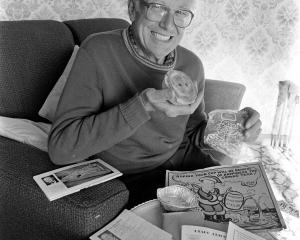Is youth really wasted on the young, asks Gina Barreca.
I've never thought that youth was wasted on the young, as George Bernard Shaw is said to have argued, because I remember far too well how much stamina, resilience and imagination it took to make it past age 25.
I haven't forgotten how much work it was to learn arithmetic or how hard it was to be dismissed with "You're too little to understand this''.
I'll never forget how, for years, I winced every time I looked in the mirror. My skin, so ravaged by acne that it looked like a battlefield, shamed me. It felt impossible to let the world - as defined by my high school crowd - see me and, I assume, judge me as ugly, but there was no alternative. My parents didn't have the money for doctors or treatments. So every morning I looked at my face and hated it, genuinely hated it, but pulled together the necessary toughness and got myself to class.
In retrospect, it took far more manufactured courage for me simply to show up on those mornings than it's ever taken me, as an adult, to address audiences of 5000 (or more, if there's a big screen) or to appear on television (where there's always a close-up).
At age 62, I've at last grown accustomed to my face. I still see scars, but I realise others look past them.
And so I give that brave girl credit, and I give the unquestioning nature of her youth credit as well.
The girl I once was didn't allow herself to stay home to avoid what felt like failure, to escape what felt like rejection, or to stay away from what she thought was a game rigged against her. And the woman I've become doesn't run from a fight, doesn't stop until she's finished, doesn't worry about being overlooked and understands, more importantly than anything else, that she's not the only one who feels this way.
What's starting to surprise me, however, is realising that a similar stamina, resilience and imagination will clearly be necessary if I'm going to make through old age.
Ranking right up there with experience, humour and excellent prescription coverage, those of us over 60 need the same guts, self-discipline and bravado that it took to survive ninth grade.
I'd pictured it differently. I figured my work would be done by now and I could just sit around offering sage advice or good-naturedly haranguing people who respected me despite my signature eccentricities.
By age 62, for example, I thought I'd be a combination of Aunt Bea from The Andy Griffith Show, Grannie from The Beverly Hillbillies and the short, dark plump fairy-godmother Merryweather from Disney's Cinderella.
Around age 40, such thoughts were soothing.
As I pickaxed my way through tenure and muscled my way into publishing, I reassured myself that it would get easier. When I got older and felt less pressure, I promised myself, I'd sleep in; I'd go to bed early; I'd eat healthier; I'd exercise more; I'd become more temperate and more sanguine.
If I couldn't actually become Aunt Bea, at least I'd become beatific.
What I didn't know is that I'd still be fretting about how to organise my next book so that a reputable publishing house will want it, or be frustrated by hacking through increasingly complex layers of malarkey in professional arenas to get work done, or, for that matter, fighting to keep basic rights for women intact.
When imagining I could relax and luxuriate in a solidly entrenched sense of self-worth once I reached a certain age, what I didn't factor in was how much the world would still fascinate and infuriate me.
There's less hunting and more gathering at this point; I can harvest some of what I've been fortunate enough to cultivate, and for that I'm grateful.
Yet because the world remains inscrutable, I remain drawn daily to the fracas and the fray. I don't want to retire from the colossal phenomenon that is ordinary life, with its noises and swerves against logic, its preposterous collisions with history and its jaunty refusals to stay down after the referee declares the match is over.
Youth isn't wasted on the young. Everything we learned then, we'll need even more once we're old.
- Gina Barreca is an author and English professor at the University of Connecticut.












